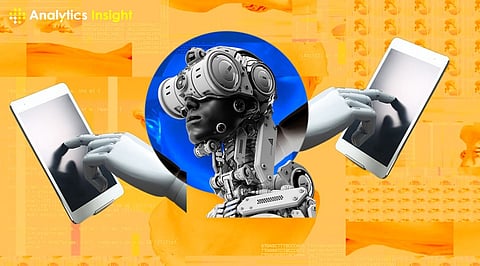
- Insights
- Cryptocurrencies
- Stocks
- White Papers
- Industry
- Geography
- Insights
- Cryptocurrencies
- Stocks
- White Papers
- Industry
- Geography


Generative AI, which plays a significant role in business intelligence (BI), is industrializing the way companies draw in decisions based on the data collected and applied to their business strategy. Generative AI means algorithms that can create new content or data trends by extrapolating it from the extensive campus of data. This transformative technology not only replaces processes but also enables people to unlock hidden expertise, forecast trends, and make data-driven decisions more quickly than ever before. This blog will examine the domain of business intelligence and how artificial intelligence has become generative in that realm.
The key app of generative AI in BI is the automation of analytics. Iterative and way-making tasks which are often part of the traditional analytics can be simplified or even fully released to AI. Generative models can generate reports and dashboards automatically without human support. Analysts will further concentrate on complex and strategic tasks after it.
Data preparation is the crucial component of BI, which involves the data gathering, cleanup, structural, and validation processes. Generative AI can sincerely come a long way in lifting the weight off the shoulders of the workers in this process through the automation of difficult tasks involved. It has functions to check errors, replaces blank values, and also, creates synthetic data enough to enlarge inadequate datasets.
In the fourth of predictive analysis, AI is better at the indention of repeating patterns and relationships among large bodies of data beyond a human analyst's worth. It is fast enough to predict market tendencies, consumer behavior, and business results with a very high level of precision. Thanks to this forecasting ability, businesses are capable of envisioning the probable revisions in the market hence they have to update their strategies in an early stage.
AI in risk management can do the historical data analysis and predict the possible risks upon which the AI can suggest damage avoidance strategies. It facilitates the simulation of various scenarios which estimates the extent of the impact of different risk factors. Such assessment provides firms with a basis to prepare for the future and reduce exposure to harsh conditions.
Effective visual data, like the ones in the diagrams or graphs, are at the core of understanding the intricate nature of given information. Data visualization, which could also apply to the cognitive tools used by generative AI, can help stakeholders understand important insights better and thus make the right decisions.
With Generative AI, customer relationship can be tailored to customers using analysis of customer data and identification of customer feedback and habits. This helps businesses to offer customized services for which their customers can have a sense of gratification and then they are likely to retain the loyalty.
Through content marketing, AI will develop appealing and meaningful content that will be categorized for different platforms. Machine learning has become an analytical tool that can interpret consumer data on interests and trends and generate articles, social media posts, and other marketing channels to attract the intended target audience.
Generative AI can robots effective throughout the entire business process such as customer service and inventory management. It acts with data, already existing data, and this allows it to do quality and accurate tasks efficiently and faster than humans, who, as a result, could be freed up for more strategic initiatives.
Generative AI helped in making data analytics more accessible to everyone, even those who don't possess any mathematical or coding skills. Through suitable AI tools with user-friendliness, people in services inside an organization can make reports and insights without specialized training which will lead to a data-driven culture where anyone can generate reports and make insights at whatever time they want to bring a competitive edge even among other companies.
Because of the generative AI AI can be used in product development as it can think through market data and consumer feedback to suggest some features and improvements. Additionally, it permits testing the products under different market conditions hence, helps with the design of better campaigns.
suspect patterns indicating fraudulating activity. By constantly processing transaction data, it can pick up on unusual behavior and mark it down as suspicious prompting the prevention of financial infringements.
